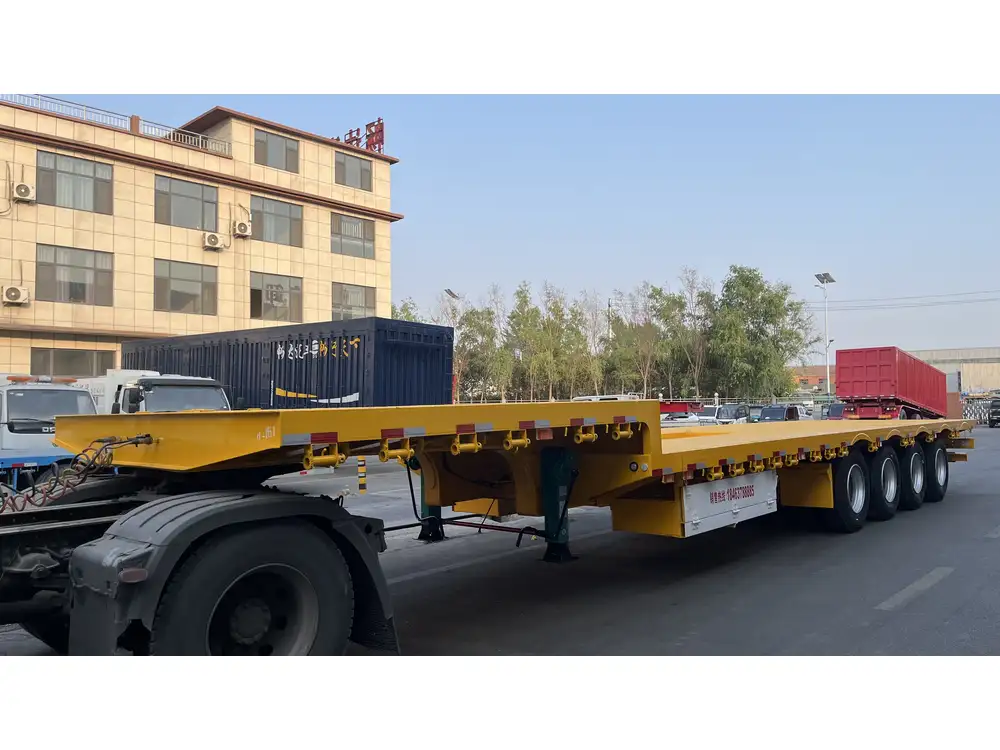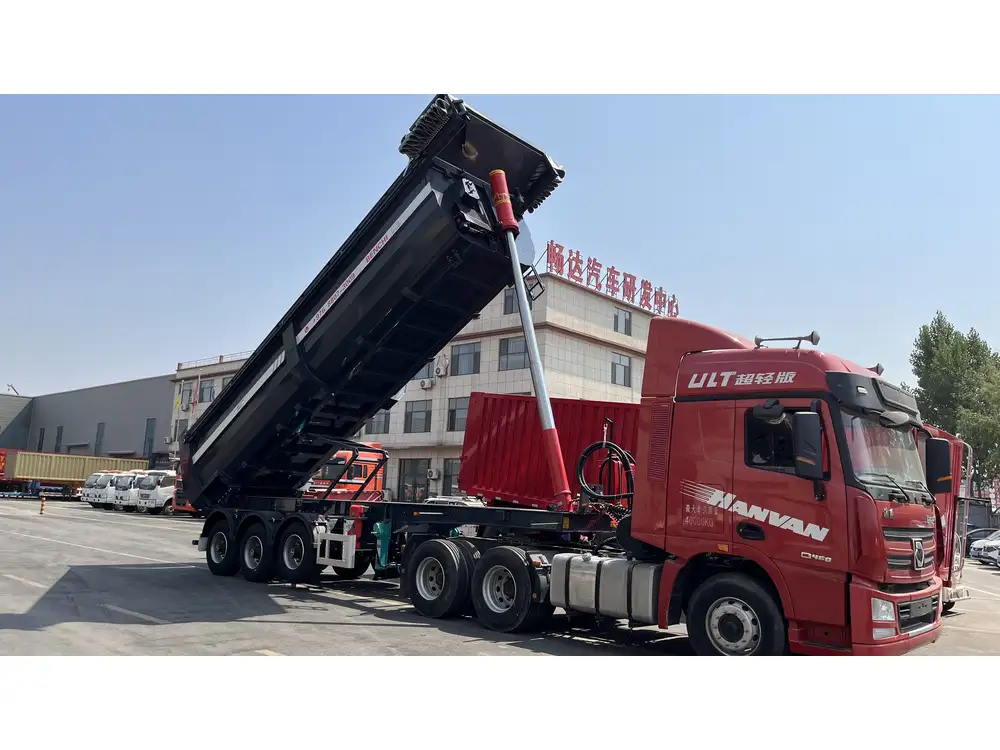Understanding the functionality and utility of trailer brakes is paramount for ensuring safety and efficiency in hauling operations. The strategic use of trailer brakes not only enhances vehicle control but also contributes to prolonging the life of both the truck and the trailer. This comprehensive guide dissects when to engage trailer brakes, helping drivers and fleet managers optimize their operations.
Understanding Trailer Brakes: An Overview
What Are Trailer Brakes?
Trailer brakes are designed to engage the braking system of the trailer independently from the towing vehicle. They serve as an essential safety mechanism, particularly in heavy-duty applications such as semi-trailers. Two primary types of trailer brakes are used in semi-trailers:
- Electric Brakes: Operated through the vehicle’s battery, they require a brake controller inside the cab.
- Air Brakes: Commonly utilized in commercial vehicles, these rely on air pressure from the towing vehicle to activate the braking system.

Importance of Proper Functioning
Efficient trailer brakes contribute to superior control during braking, which is crucial in varied driving conditions such as steep declines, adverse weather, and heavy loads. Understanding their role in stopping distances and vehicle stability is essential for all operators.
Key Considerations for Utilizing Trailer Brakes
Recognizing When to Engage Trailer Brakes
Knowing when to apply trailer brakes can significantly affect stopping distance and stability. Here are critical situations to consider:
| Scenario | Recommended Action |
|---|---|
| Descending Steep Grades | Engage trailer brakes to reduce strain on the truck’s brakes. |
| Heavy Load | Apply trailer brakes early to avoid abrupt stops. |
| Wet or Slippery Roads | Use trailer brakes cautiously to prevent skidding. |
| Emergency Situations | Engage both truck and trailer brakes to maximize stopping power. |
| Turning Corners with Heavy Loads | Apply trailer brakes lightly to maintain control and prevent sway. |

Factors Influencing the Use of Trailer Brakes
Several factors can affect how and when to use trailer brakes:
- Weight Distribution: Unevenly loaded trailers can create instability. Trailer brakes help to manage these dynamics.
- Road Conditions: Adverse weather necessitates a more cautious approach to braking.
- Trailer and Truck Compatibility: Not all trucks and trailers have the same braking systems. It’s crucial to ensure compatibility to optimize braking performance.
- Driver Experience and Training: Experienced drivers will intuitively know when to apply brakes compared to novice drivers who might need additional guidance.
How Trailer Brakes Work
Mechanisms of Operation
Trailer brakes function through a variety of systems that include both electrical and mechanical components. Understanding their operation enhances the driver’s ability to use them effectively:
- Electric Brakes: Engage when the driver applies the truck brakes, sending a signal to the brake controller, which activates the circuit to the trailer’s brakes.
- Air Brakes: Rely on the compressed air system in the truck. When the driver applies the brakes, air is sent to the trailer’s brake chambers, causing the shoes to press against the brake drum.

Adjusting Trailer Brake Settings
Most modern electric brake controllers allow for adjustments in gain, which controls the power sent to the trailer brakes. Key adjustments include:
Gain Settings
- Low Gain: Suitable for lighter loads or when driving in slippery conditions.
- High Gain: Ideal for heavy trailers, offering maximum braking force.
Regular Maintenance Checks
Ensuring that trailer brakes perform optimally involves regular maintenance:
- Inspection of Brake Pads: Check for wear and replace them as necessary.
- Brake Controller Setup: Verify that the brake controller is properly calibrated.
- Electrical Connections: Inspect for any loose wiring or corrosion.

Safety Implications of Using Trailer Brakes
Using trailer brakes correctly has profound safety implications. Some benefits include:
- Enhanced Vehicle Control: Independently using trailer brakes allows for better handling during braking.
- Reduced Stopping Distances: Engaging trailer brakes in tandem with truck brakes minimizes stop time, particularly crucial in emergency scenarios.
- Decreased Brake Fade: Distributing the braking load across both truck and trailer brakes helps prevent overheating.
Common Mistakes to Avoid
- Over-Braking: Applying trailer brakes too aggressively can destabilize the trailer, especially on turns.
- Neglecting Brake Adjustments: Failing to adjust the brake controller settings can lead to either ineffective or excessive braking.
- Ignoring Road Conditions: Adapting braking strategies based on environmental factors is crucial for safe operation.
Training and Best Practices for Operators

Driver Education on Trailer Brake Usage
Training programs should emphasize understanding:
- Proper Braking Techniques: Emphasize gradual application rather than sudden engagement of brakes.
- Situational Awareness: Encourage operators to assess road conditions and load profiles continuously.
- Regular Practice: Encourage practice in varied driving situations to develop instinctive responses.
Key Best Practices
Here are some actionable best practices for driving with semi-trailers:
- Plan Ahead: Anticipate stops and decrease speed early to allow for safe braking.
- Communicate with Other Drivers: Use signals and lights to inform other road users about your intentions.
- Regular Training: Attend refresher courses to stay updated with best practices in braking technology.
Conclusion
Optimizing the use of trailer brakes not only improves safety and vehicle longevity but also enhances overall operational efficiency. By understanding when and how to engage trailer brakes, operators can navigate varying conditions confidently and effectively.
As semi-trailers continue to be integral to logistics and transportation, a commitment to continuous learning, regular maintenance, and adherence to best practices will ensure that drivers and fleet managers maximize their efficiency while maintaining the highest safety standards on the road.
For those looking to enhance their understanding of trailer brakes or seeking expert advice, establishing ongoing education and adapting to new technologies will be paramount to success in an ever-evolving transportation landscape.



